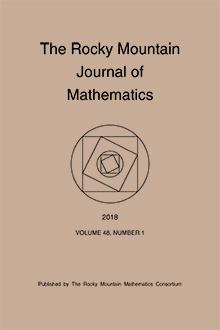Abstract
For each nonzero cardinal number $\kappa$, there is a field extension $\mathbf{Q} \subseteq L$ and a maximal chain $\mathcal{H}_{\kappa}$ of intermediate fields going from $\mathbf{Q}$ to $L$ such that the cardinal number of $\mathcal{H}_{\kappa}$ is $\kappa$. If $\kappa$ is infinite, then for all infinite cardinals $\nu%_1 \lt \nu_2 \leq \lt \kappa$, it can be arranged that $\mathcal{H}_{\nu%_1 } \subset %\mathcal{H}_{\nu_2} \subseteq \mathcal{H}_{\kappa}$. However, there exists an infinite cardinal for which there does not exist a field extension $L/K$ such that $\kappa$ is the supremum of the cardinalities of chains of intermediate fields going from $K$ to $L$. For a field extension $L/K$, this supremum of cardinalities has been denoted $\lambda(L/K)$. If $L/K$ is infinitely generated, we reduce its calculation to set theory, as follows. Let $\ala$ be the infimum of the cardinalities of generating sets of $L/K$. Let $\Omega(\aleph_{\alpha})$ be the supremum of the cardinalities of chains %that consist of subsets of a set of cardinality $\ala$. ($\Omega(\aleph_{\alpha})$ is equal to what has been called $\mbox{ded\,}(\aleph_{\alpha})$ in the literature.) Then $\ala\lt \oa\leq \p$; and if $\alpha > 0$ (but not necessarily if $\alpha =0$), then $\lambda(L/K)=\Omega(\aleph_{\alpha})$.
Citation
David E. Dobbs. Raymond C. Heitmann. "Realizing infinite cardinal numbers via maximal chains of intermediate fields." Rocky Mountain J. Math. 44 (5) 1471 - 1503, 2014. https://doi.org/10.1216/RMJ-2014-44-5-1471
Information





